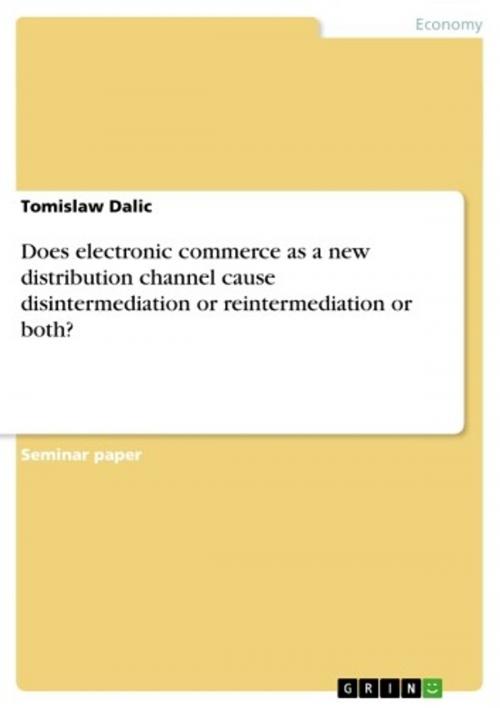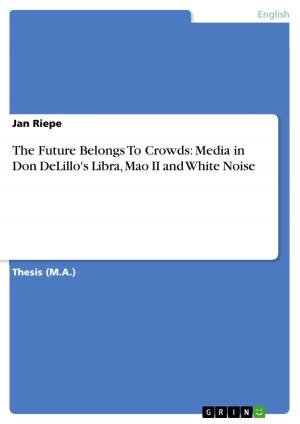Does electronic commerce as a new distribution channel cause disintermediation or reintermediation or both?
Business & Finance, Marketing & Sales| Author: | Tomislaw Dalic | ISBN: | 9783638245371 |
| Publisher: | GRIN Publishing | Publication: | January 15, 2004 |
| Imprint: | GRIN Publishing | Language: | English |
| Author: | Tomislaw Dalic |
| ISBN: | 9783638245371 |
| Publisher: | GRIN Publishing |
| Publication: | January 15, 2004 |
| Imprint: | GRIN Publishing |
| Language: | English |
Seminar paper from the year 2001 in the subject Business economics - Marketing, Corporate Communication, CRM, Market Research, Social Media, grade: very good, Maastricht University (Faculty of Economic and Business Administration (FdEWB)), 20 entries in the bibliography, language: English, abstract: 'Electronic commerce is an emerging concept that describes the process of buying and selling or exchanging of products, services, and information via computer networks including Internet.'(Turban, Lee, King and Chung, 2000). Electronic commerce, or short e-commerce, promised many benefits and golden opportunities often described by terms like business-tobusiness (B2B) or business-to-consumer (B2C). Those terms are now often used in commercials and advertisements. After only a short while new terminology was invented to describe the new opportunities of e-commerce. The old terms lost their impressiveness much too fast. Venture capital was readily available to finance business models described by peer-to peer (P2P) and consumer-to-business (C2B). The online world but also their financial partners found themselves in the middle of hype. One of the great effects predicted was an effect named disintermediation. This term describes according to Chaffey, Mayer, Johnston and Ellis-Chadwick (2000) the removal of intermediaries. The former linkages between customers and companies like brokers or distributors are replaced by the electronic channel. The picture some dot.com entrepreneurs painted was one of a world without travel agencies, toyshops, electronic retailers and other intermediaries. Disintermediation caused some mid-sized channe l relationship earthquakes after a rebellion from the intermediaries. Resellers of the Apple's I-Mac gave Steve Jobs at a presentation in Paris, Europe a hard stand. Mr. Case was there to inform retailers about Appel's newest PC model. His announcement, that the I-Mac will be exclusively available via the Internet for an introduction period of four weeks, created whistle blowing and tumults among the resellers. The upset intermediaries feared that this four weeks were just a try out for their uncertain future (Stein, 2000). It comes at no surprise that intermediaries rebelled as companies tried to shortcut them with the help of electronic commerce. Another example of disintermediation is Steven King, who tried to sell a new book via the Internet. He put the first chapters online for free and would only write further chapters if most people would pay him. The project called 'The Plant' ended not successfully. Stephen King discontinued his trial because the percentage of paying customers dropped with every chapter (Der Spiegel, 2000). [...]
Seminar paper from the year 2001 in the subject Business economics - Marketing, Corporate Communication, CRM, Market Research, Social Media, grade: very good, Maastricht University (Faculty of Economic and Business Administration (FdEWB)), 20 entries in the bibliography, language: English, abstract: 'Electronic commerce is an emerging concept that describes the process of buying and selling or exchanging of products, services, and information via computer networks including Internet.'(Turban, Lee, King and Chung, 2000). Electronic commerce, or short e-commerce, promised many benefits and golden opportunities often described by terms like business-tobusiness (B2B) or business-to-consumer (B2C). Those terms are now often used in commercials and advertisements. After only a short while new terminology was invented to describe the new opportunities of e-commerce. The old terms lost their impressiveness much too fast. Venture capital was readily available to finance business models described by peer-to peer (P2P) and consumer-to-business (C2B). The online world but also their financial partners found themselves in the middle of hype. One of the great effects predicted was an effect named disintermediation. This term describes according to Chaffey, Mayer, Johnston and Ellis-Chadwick (2000) the removal of intermediaries. The former linkages between customers and companies like brokers or distributors are replaced by the electronic channel. The picture some dot.com entrepreneurs painted was one of a world without travel agencies, toyshops, electronic retailers and other intermediaries. Disintermediation caused some mid-sized channe l relationship earthquakes after a rebellion from the intermediaries. Resellers of the Apple's I-Mac gave Steve Jobs at a presentation in Paris, Europe a hard stand. Mr. Case was there to inform retailers about Appel's newest PC model. His announcement, that the I-Mac will be exclusively available via the Internet for an introduction period of four weeks, created whistle blowing and tumults among the resellers. The upset intermediaries feared that this four weeks were just a try out for their uncertain future (Stein, 2000). It comes at no surprise that intermediaries rebelled as companies tried to shortcut them with the help of electronic commerce. Another example of disintermediation is Steven King, who tried to sell a new book via the Internet. He put the first chapters online for free and would only write further chapters if most people would pay him. The project called 'The Plant' ended not successfully. Stephen King discontinued his trial because the percentage of paying customers dropped with every chapter (Der Spiegel, 2000). [...]















